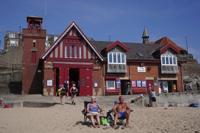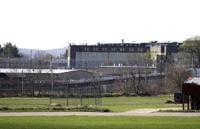LONDON (AP) — British health officials are warning people across the country to take precautions when out in the sun as the U.K. bakes under its first heat wave of the year.
Temperatures are expected to peak at 34 degrees Celsius (93 degrees Fahrenheit) in some parts of eastern England on Saturday following a week of unusually warm weather, according to the national weather agency the Met Office. That’s about 12 C (22 F) higher than normal for this time of year.
The U.K. Health Security Agency has issued an amber heat health alert covering all of England because of increased health risks for people over 65 and those with heart and lung problems.
“Heat can result in serious health outcomes across the population, especially for older adults or those with pre-existing health conditions,” Dr. Agostinho Sousa, head of the UKHSA, said in a statement. “It is therefore important to check on friends, family and neighbors who are more vulnerable and to take sensible precautions while enjoying the sun.”
Saturday is expected to be the hottest day of the heat wave, with temperatures falling slightly on Sunday and dropping back into the more normal temperatures next week, the Met Office said. The heat alert is currently scheduled to remain in effect until Monday morning.
Unusually, temperatures in this week have been higher than in many parts of Western Europe. That’s because the high temperatures are not the result of hot air moving north from the Iberian Peninsula or North Africa as is often the case, the Met Office said. Instead, this weather system originated in air high over the Atlantic Ocean south of Greenland. As it approaches the U.K., it descends toward ground level, causing it to warm rapidly, Chief Meteorologist Matthew Lenhert said.
That said, it has been plenty hot in Europe too. Aviation enthusiasts attending the Paris Air Show in Le Bourget, north of Paris, this week sought the shade of a Boeing 777’s wing, cooling off as temperatures hovered in the low 30s C (mid-80s F.)
Met Office scientists this week published research showing that climate change is increasing the likelihood of extreme high temperatures in the U.K. The chance of temperatures exceeding 40 Celsius (104 F) is now more than 20 times higher than it was in the 1960s, the researchers said.













































